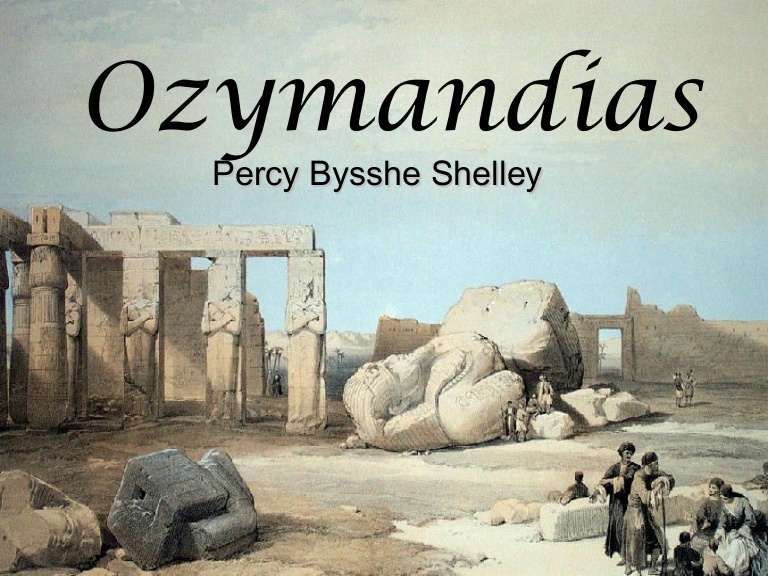

Exploring the Themes in the PoemĪlthough the main theme is how nothing can withstand the power of time, it is not fair to consider only that aspect of the poem. This applies to all political regimes, governments, and authorities for one day it will crumble down to pieces and dust without doubt, with the power of time. This is an important lesson to be learned, mainly because it reminds every single person that fame and glory will never last forever.Įven the most powerful will be brought down, either during their lifetime or after death, and their names will be forgotten over time. This is aimed at his subjects as well as his opponents, whom he intends to cause despair with his haughty and arrogant establishment of power.īut the astounding irony lies in the fact that there is absolutely nothing to look upon and be awestruck but stretches of sands as far as the eyes can see, surrounding the remains of the statue. It summons the spectators to look at his prestigious works and lose the hope of overpowering him. The pedestal below the figurine proclaims itself to be the ‘King of Kings’, showing the self-esteem and ego that Ozymandias carries in himself. It is also said that the ‘traveler from an antique land’ mentioned in the first line of the poem refers to Diodorus.


Shelley possibly drew inspiration from the discovery of the remains of the pharaoh’s statue that were discovered earlier that year, and the influence of the Greek historian, Diodorus Siculus’ works on Egypt, to pen this masterpiece. From the next line (9), the reader can confirm that the statue belongs to Ozymandias, from the words inscribed on the pedestal.Īs mentioned earlier, this could refer to the Egyptian pharaoh Ramesses II. He applies a synecdoche stating the hands of the sculptor mocked the facial expressions as he manages to depict them closely in the spiteful statue, with the emotions that were fed by the heart of the tyrant. It is indeed the art and talent of the sculptor that has withstood the effect of time, still intact beyond the wear and tear, and seasonal changes, and not the statue or its owner who considered himself to be eternal and mighty. He feels the sculptor was able to read the emotions on the face of the authoritarian figure and replicate them well. The tourist also appreciates the skilled sculptor who managed to etch the facial expressions aptly while installing the statue. This indirectly describes that the statue belonged to a cruel and unkind person, who was also in power at the time.

The descriptions of the facial features give an insight to the reader about the sculpture’s persona. He describes a massive statue, presently in a dilapidated condition, with two trunkless legs and a shattered face that is half-embedded within the sands as the only remnants left behind by time, to tell the tale of the then mighty structure. The traveler talks about what he’s seen in the land and shares the sight. The poet narrates his rendezvous with a traveler who has returned from a historic place. The lone and level sands stretch far away.” Summary Of that colossal Wreck, boundless and bare Look on my Works, ye Mighty, and despair! The hand that mocked them, and the heart that fed Which yet survive, stamped on these lifeless things, Tell that its sculptor well those passions read Half sunk a shattered visage lies, whose frown,Īnd wrinkled lip, and sneer of cold command, Who said-“Two vast and trunkless legs of stone The in-depth message and intellect in this poem are to be lauded beyond words, for Shelley has conveyed it so efficiently through his work. Written as a sonnet, a short poem of fourteen lines in the form of an octave and a sestet, the poem has a distinct rhyme scheme that adds to the overall reading experience. It talks about the temporary nature of things in this world that one considers most important – fame, wealth, and power, against tougher forces. It is said that the poem is based on the king, and Ozymandias eventually became one of Shelley’s most famous works in the Romantic era. Here, let’s see the Main Theme of the Poem Ozymandias. Ozymandias was the Greek name for the ancient Egyptian pharaoh Ramesses II (or Ramses II), who ruled major parts of Egypt for 66 years and was celebrated as Ramesses the Great for years later. Ozymandias is a poem written by the renowned English poet Percy Bysshe Shelley, popularly known as P.


 0 kommentar(er)
0 kommentar(er)
